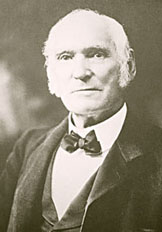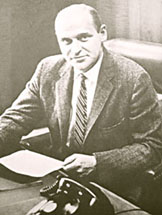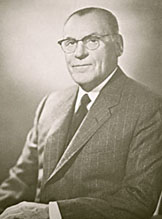|
COVER STORY | IN
THE NEWS | FROM
THE PUBLISHER | DIRT
July 20, 2006
What if Warren Murphy had won the battle for Pacific Lumber Co.? by HANK SIMS THE SKIES WERE FOGGED OVER MOST OF LAST WEEK, EVEN DOWN SOUTH OF SCOTIA. Outside the "Immortal Tree," a roadside attraction on the north end of the Avenue of the Giants, old folks in shorts, strangers to these parts, mulled around in Tuesday's cool weather, gazing at the beaten-up old-growth redwood — charred by fire, scarred by lightning — then moved into the gift shop. A leathern fleet of Harley riders showed up. They pulled in, dismounted and stretched, shaking off the vibration from the trip up the scenic route. Off a side street, past a sleepy flat and across
the Eel, Warren Murphy piloted a tractor around one of his family's
hay fields, a summer chore that one Murphy Left: Warren Murphy. Photos by Hank Sims. There was a time when Warren Murphy, like his ancestors before him, had a personal interest in those hills, and in the rest of Pacific Lumber's hundreds of thousands of acres. His great-great-grandfather had owned the company. Succeeding generations expanded its timber holdings, especially during the Depression, when land was going cheap. Even after his father, Stanwood A. Murphy, took the company to the New York Stock Exchange in the 1970s, he continued to run the place, and many expected that his sons and their sons would continue to do so. But that was before Pacific Lumber — and with it, the county at large — ran headlong into the Wall Street sharks that ran amok in the country in the 1980s. Since then, the forests above Murphy's house are only scenery to him. They have to fend for themselves. And who knows how they'll end up? After a bumpy 20-year run in Humboldt County, the Maxxam Corp., the Houston-based holding company that bought out Pacific Lumber, is on the wane here. Charles Hurwitz, Maxxam's founder, chief executive officer and largest shareholder, financed his takeover on the back of the company, putting it deeply into hock to pay for the pleasure of becoming owned by him. That debt has never been paid down significantly, despite the billions of dollars the company generated from operations and from asset sales in years since. Nowadays, the company struggles to keep itself out of bankruptcy, selling off land and frantically borrowing cash in order to scrape together enough to service the company's massive debt. The company has to find around $28 million each January and July — this semester's payment comes due this week — just to pay off the interest. Lately, that money hasn't come from making boards. When Hurwitz made his successful play for Maxxam in 1985, lots of people figured that no good would come of it. Warren Murphy, then 33 years old and the company's manager of lumber operations as well as its heir apparent, was one of them. And though he fought it as hard as he knew how, and for as long as he had a chance, he lost, and the forward-looking company his ancestors built — everything they and 100 years of Pacific Lumber employees had worked for — was gone. Logging got a bad name. And though Warren Murphy still works his fields, not much else has been the same in Humboldt County since.
The Murphys' Pacific Lumber was a prudent company, and that's what made it so vulnerable when the 1980s rolled around. PL had billions of dollars in assets — trees, land, factories, a San Francisco office building — but relatively small profits. The company was managed for a slow, steady return, and its low share price reflected that strategy. But in terms that became well known as the era of hostile takeovers heated up, Pacific Lumber was undervalued. Someone could buy all the stock in the company, become its sole owner, and make an instant profit. The shares could be bought for hundreds of millions, but it had billions of dollars in assets. Charles Hurwitz, who made his name and his money in mergers and acquisitions, set about buying the company, eventually informing PL stockholders that he was prepared to offer them much more than the current going rate for their interest in the company. After some debate, and a lot of internal controversy within the company, Pacific Lumber's board of directors voted to give its approval to the deal. Then, following the board of directors' lead, the shareholders at large did the same. And once he had control, Hurwitz essentially mortgaged the company itself to pay for the deal. Warren Murphy, at the time, was on the fast track to succeed his father, who had died a few years earlier. He had been to business school, and he thought he saw what was coming. He lobbied his mother, who sat on the company's board of directors, to vote against the deal that Hurwitz was offering. But he was too young, and she didn't heed his advice. Later, he and his brother took a case against Maxxam to court. A judge tossed it out. After Maxxam bought the company, it instantly increased — doubled or tripled — the rate of cut. The strategy then and the strategy since, cynics say, has been to convert those paper assets into hard cash as fast as ever the company could.
If this was the plan, it didn't go as smoothly as Hurwitz could have hoped. Four years after the takeover, environmental activists staged Redwood Summer, a three-month long series of protests designed to bring attention to overcutting in North Coast forests. Then came the fight to preserve Headwaters Forest, then the largest privately-held stand of old-growth redwood left in the world. Then the regulatory agencies started to take greater notice of the company's activities. Under Maxxam management, Pacific Lumber rapidly shedded its image as a "darling of the environmentalists." Instead, the company's name became a synonym for greed. Warren Murphy said last week he was certain that Hurwitz was slowed somewhat — harvesting 200,000 acres of trees took a bit more time than he could have imagined — but that he'd adjusted his game plan, and that he'd come out all right. "No one, no one, has ever called Charles Hurwitz stupid," he said. What concerned him most was what would happen to the company. "I think the best-case scenario is that the sooner that Hurwitz lets the bondholders take over, the better it's going to be," he said. "My hope is that it goes to a group who says, 'O.K. We're going to take it back to where it used to be.' Or that it goes to a real, honest-to-God timber company. I think both would be better than it is right now."
It's tempting to imagine things as they could have been. So much of Humboldt County history dates from those decisive few months when Maxxam won and the resisters — Murphy, Eureka attorney Bill Bertain and a large percentage of Pacific Lumber's rank-and-file — lost. Of course, there's the company's own trajectory to consider — the fates and livelihoods of the people working for what was then the county's largest private employer. Then there's the company's economic impact on the community at large, and the stewardship of a large swath of the county's land. But not least, there's the Humboldt County culture war, the mutual hostility and fear that passes between the descendants of the loggers and the descendants of the hippies. Its influence on Humboldt County society is overwhelming, and the majority of it springs from fights over Pacific Lumber. So what if it had been the other way around? What if Warren Murphy were president of Pacific Lumber today? When Murphy was asked this last week, he had an answer ready. In the first place, he said, the company wouldn't have been saddled with the enormous debt that Maxxam has placed on it. So it would have been able to stay the course with its ban on clearcutting, and on its 100-year sustained yield plan. Pacific Lumber never would have gone on the frantic harvesting spree that it did in the late '80s and early '90s, and it would have been able to continue to respond to new environmental concerns. "We would have still been leading the way, showing others how it could be done," he said. Second, the company would have taken on some debt in order to protect the company from buyouts like the ones Hurwitz mounted. (The more the debt, the less the book value of the company.) But it would have used that money for investment, to diversify the company's operations. The company may have invested more in power generation, a business it had entered with the construction of its Scotia biomass plant. Third, the company could trade on its name for high-quality woods to develop new product lines in cooperation with producers elsewhere — Brazilian mahogony, or Hawaiian koa. "Bring in some other woods from companies as environmentally concerned as we are," he said. "We could have sort of developed this whole motif." And by now, with the new market for ecologically conscious labels, Pacific Lumber could have charged a premium for such goods, including its main redwood line." Murphy acknowledged that no one would know for certain how the last 20 years would have played out with the company, but he was certain that the old-school Pacific Lumber values, the ones that his ancestors instilled into the company, would have seen them through. "You could see the company possibly going this way, maybe going that way," he said, "but it had a lot of advantages. It had a lot of cash to do what it wanted to do."
David Harris' 1996 book The Last Stand, about Maxxam's takeover of Pacific Lumber and the subsequent fight to preserve the Headwaters Forest, portrays Warren Murphy's last day at Pacific Lumber. On February 26, 1986 — the day after the takeover became complete — Murphy resigned to John Campbell, an Australian expat he had worked with for years. Campbell was then an executive vice-president of the company; after the takeover, he became its president and chief executive officer. (Campbell retired in 2001. Earlier this year, he was elected to the Fortuna City Council and appointed mayor.) In Harris' telling, Murphy knew that it was time to move on when he and his allies definitively lost the shareholders' vote. On the previous day, the votes had been counted, and 82 percent of the company's ownership voted for merger. Pacific Lumber ceased to exist as an independent company. From now on, the out-of-town money would call the shots. Once friends, Warren Murphy and Campbell — who, by all accounts, was a savvy office politician — had parted ways over the takeover. Murphy went to Campbell's office to tell his boss he was quitting:
That wasn't quite true, Murphy said last week. In the intervening years, he'd seen Campbell around when he summered at the ranch, and the two were polite to each other. Nothing more. He had seen how Campbell behaved during the takeover, and he was never quite sure what Campbell had been up to behind the scenes back then. Then, last fall, there was a benefit auction for Fortuna's Redwood Memorial Hospital. Murphy attended with his brother Woody, owner of Humboldt Bay Forest Products. Campbell was there, too. He had long been retired from the company, and Warren decided it was time to reconcile. According to Warren's telling, he went over to Campbell, who was confused at first, and said that since they were both out of the company, what's done is done.
"He donated a Scotch whiskey tasting," Murphy recalled. "And I don't drink Scotch — to save my life, I can't drink that stuff! But you know what? Woody and I bought this thing and I said: 'He donated it, I'm going to buy it. We're going to his house and we're going to do something about it.' Woody's still having a real tough time with it, so I don't want to speak for him, but I think he's sort of on the edge of saying we'll give it a shot." Murphy moved on long ago. He recently sold one of his companies, a cabinet-manufacturing plant that he had retooled to make snowboards and then skateboards. He's still got another company, a manufacturer that makes heavy equipment for the construction industry. But he admits that he can't put it all behind him. He still comes up every summer, and every year he throws a Fourth of July party for his old friends at the company. Earlier that week, he had a former coworker — a worker, not a boss — over for dinner. His guest got up to say his goodbyes, and suddenly they found themselves talking about the old days, about what it was and what it is now. They stood there talking for an hour, Murphy said. That Tuesday at his ranch, he seemed a naturally sunny person. He took pleasure in speaking his mind, and he was eager to forgive those who had wronged him. But it broke his heart — not so much the death of the company his family built, but the way that it was emptied of its meaning. He said: "If you talk to anybody in the company back in the '80s, it was more of, 'My son's going to be here. What are you going to do about that? Where's he going to live? What kinds of jobs are going to be available then?' Now, you don't hear that anymore. I would say the employees, at this point — 90 percent of them don't give a shit. They think it's done, it's finished." COVER STORY | IN
THE NEWS | FROM
THE PUBLISHER | DIRT
Comments? Write a letter! © Copyright 2006, North Coast Journal, Inc. |


 or another has undertaken time
out of mind. The hay was baled the old-fashioned way, in massive
rounds too heavy to buck. One by one, Murphy clasped the bales
with a mechanical claw, lifted them into the air and ferried
them back to a flat-bed trailer, stacking them in neat rows to
be hauled off to the barn. He worked the field alone. Above him,
boxing in the 350-acre family ranch on three sides, were steep,
forested hills — Pacific Lumber land.
or another has undertaken time
out of mind. The hay was baled the old-fashioned way, in massive
rounds too heavy to buck. One by one, Murphy clasped the bales
with a mechanical claw, lifted them into the air and ferried
them back to a flat-bed trailer, stacking them in neat rows to
be hauled off to the barn. He worked the field alone. Above him,
boxing in the 350-acre family ranch on three sides, were steep,
forested hills — Pacific Lumber land.





